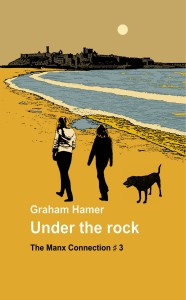Ideas for Novels
I’m often asked how I come up with ideas for new novels. It’s more often phrased “Where do you get your ideas from?”. In fact, it’s probably the most asked question of all. And I admit that, at first, it could be tough sometimes coming up with a good idea. However, as time has gone on, I’ve found that it becomes easier and easier. I’ve tried to analyse how I get ideas for novels and here’s my best guess…
Trust your curiosity
This is probably the most important key to writing fiction. You have to take noticeof those things that you’re curious about and then lean towards those aspects of your life. Curiosity is about what catches and holds your attention. Think of it like this; if you’re in a bookstore, which areas do you naturally go to before others? If you’re on holiday and have time on your hands, what do you want to do with that time? If you’re in a train, why do you notice some people more than others?
If both you and I were sat on a beach and looked around, I might notice a small cave and wonder if it lead anywhere and if so, where. You might be more inclined to notice the big fat man with Speedos who really shouldn’t let his belly hang out like that. That’s fine because we are surrounded daily by thousands of different stimuli; smells, sounds, sights, and things happening. But you will perceive different things than I would, and different things would interest you. So the first secret to getting ideas for novels is to noticing those things. Be curious
Fill your mind first in order to produce
You can’t create anything if your mind is empty, so you need to fill it with creative thoughts and ideas before you can get ideas for novels. If you try to create from a mind that’s devoid of sights, sounds or memories, you will find yourself ‘blocked’ pretty fast because there’s nothing for your imagination to work with.
Take time out go somewhere that will fill your mind with something new. An art gallery, a museum, a seminar, or even just time to read a book on a new topic. Take a notebook and write down anything you notice that interests or stimulates you.
Use real people and places to trigger your creative thoughts
From time to time, try and put yourself in situations where you’re out of your comfort zone. When you visit somewhere new, notice what you’re feeling and remember what you are seeing. Take your notebook and write down what you see. Little notes and impressions are fine at this stage.
Create a MacGuffin if you can
In thrillers and mysteries, the MacGuffin is the object that the characters are searching for, and it’s intriguing enough to become the center of the book. (think the Ark of the Covenant and the Holy Grail). A MacGuffin isn’t essential, but it helps concentrate the reader’s mind.
What draws you to certain people?
You will always need characters for your books. Think of the people you know. Which of them (maybe with some added characteristics) would make a great character for you book? Likewise, which of them repel you. What is it about them that repels you? (But never portray a character as exactly like the real person). For the moment, you are just filling the creative well. The story will emerge soon!
Use real places and events
In your life, you have seen and experienced many things. How many of them could be knitted into a novel? Probably more than you think.
What if?
 “What if” questions are often the basis for a good book. As an example, Under the Rock came about by me doing what I said earlier – sitting on a beach and noticing a small cave and wondering if it lead anywhere and if so, where. And once I had decided that I might go under Peel Castle, I wondered what I could do with that information. Obviously, if the entrance could somehow be kept secret, something or somebody could be hidden there. And the rest, as they say, is history!
“What if” questions are often the basis for a good book. As an example, Under the Rock came about by me doing what I said earlier – sitting on a beach and noticing a small cave and wondering if it lead anywhere and if so, where. And once I had decided that I might go under Peel Castle, I wondered what I could do with that information. Obviously, if the entrance could somehow be kept secret, something or somebody could be hidden there. And the rest, as they say, is history!
Use themes and issues you care about
If you’re writing a novel, remember that it’s a story, not a lecture, so you have to be careful not to preach. On Amazon, one of the reviews for Under the Rock says, “…I do sense he stretches his characters to voice his opinions on religion and politics. It gets very tiresome after a while; just get on with the tale.”. What is strange to me is that I voice opinions on religion a heck of a lot more in On whom the axe falls. I felt (and still do feel) that I was quite restrained in Under the Rock. Which I guess goes to show that you can’t please all of the people all of the time!
So now you have filled your head (and notepad) with lots of thoughts, you’ll find that ideas will start to spring out at you. Follow them through and start writing!
